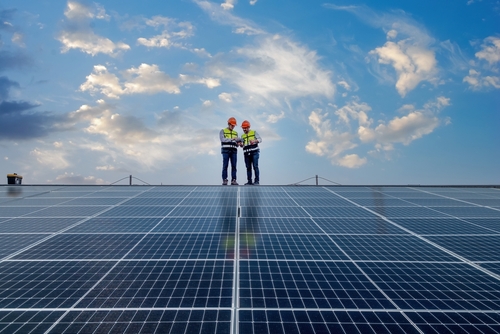
Choosing the Right Solar Panels for Your Home: Factors to Consider
March 8, 2024
Understanding Solar Energy Systems: A Comprehensive Guide
May 2, 2024How Commercial Enterprises Can Benefit from Going Solar

How Commercial Enterprises Can Benefit from Going Solar
How Commercial Enterprises Can Benefit from Going Solar. In the current global landscape, the shift towards renewable energy sources is not just a trend but a strategic move for businesses aiming for sustainability and efficiency.
Solar power, a leading form of renewable energy, is at the forefront of this shift, offering commercial enterprises a pathway to sustainable business practices and operational excellence.
This comprehensive guide explores the benefits of solar energy for businesses, covering everything from basic concepts and installation processes to financial incentives and common concerns.
The Basics of Solar Power for Businesses
Solar power harnesses the sun’s energy, converting it into electricity through photovoltaic (PV) panels.
For businesses, this means the installation of solar panels on rooftops or other suitable spaces, enabling them to generate their own electricity.
The types of solar energy systems available range from grid-tied setups, which remain connected to the national grid, to completely off-grid or hybrid systems, offering flexibility to meet various energy needs.
Key Benefits of Adopting Solar Power

Cost Savings
One of the most compelling arguments for adopting solar power is the significant reduction in electricity bills.
Over time, the initial investment in solar installation can yield a substantial return on investment (ROI) through savings on utility costs.
Environmental Impact
Switching to solar power allows businesses to dramatically lower their carbon footprint, aligning with global sustainability efforts and adhering to local environmental policies.
This proactive approach to environmental responsibility is not just good for the planet but also resonates positively with customers and stakeholders.
Energy Independence
Solar power reduces a business’s reliance on the national grid, safeguarding against energy price fluctuations and potential shortages. This independence enhances operational stability and predictability in financial planning.
Enhanced Business Reputation
Adopting solar energy can significantly improve a company’s public image, attracting eco-conscious customers and employees who value sustainability and corporate responsibility.
Evaluating Your Business’s Solar Potential

Before transitioning to solar, businesses need to consider several factors, such as location suitability, available roof space, and energy consumption patterns. A professional site assessment is crucial to determine the feasibility and scale of a potential solar installation.
The Installation Process
The transition to solar energy involves a series of steps, from initial consultation and design to installation and commissioning. Typically, the process can be completed within a few months, depending on the project’s complexity and scale.
Common Concerns and How to Address Them
Misconceptions about solar power, such as prohibitive initial costs and maintenance worries, often deter businesses. However, financial incentives, coupled with the decreasing cost of solar technology and straightforward maintenance routines, make solar a viable and attractive option for businesses of all sizes.
Maintenance and Upkeep
Solar panel systems require minimal maintenance, primarily regular cleaning and occasional inspections to ensure optimal performance. With an expected lifespan of 25 to 30 years, solar installations offer long-term, reliable energy production.
Future-Proofing Your Business with Solar Energy
Investing in solar power is not just about meeting current energy needs but also about anticipating and adapting to future business growth and technological advancements. Solar installations are scalable and adaptable, offering businesses a flexible approach to energy management.
Frequently Asked Questions

Can my business operate solely on solar power?
Yes, it is possible for a business to operate solely on solar power, especially if it’s located in a region with ample sunlight.
This typically requires a sufficiently large solar panel system to meet all energy needs and may also involve the use of battery storage to ensure power availability during the night or on cloudy days.
The feasibility of operating entirely on solar power also depends on the business’s energy consumption patterns and the ability to invest in a comprehensive solar solution.
What happens to excess solar energy generated?
Excess solar energy generated by a business’s solar panel system can often be stored in battery systems for later use or sold back to the grid through net metering programs, where available.
Net metering allows businesses to earn credits for the excess electricity they generate, which can be used to offset electricity costs when solar production is lower than consumption.
The specific arrangements for dealing with excess solar energy vary by location and utility policies.
How does inclement weather affect solar panel efficiency?
Solar panels can still produce electricity on cloudy days, but their efficiency may decrease depending on the density of cloud cover.
However, modern solar panels are designed to be highly efficient and can generate significant power even in less-than-ideal weather conditions.
Heavy rain can actually help clean the panels and improve performance over time.
Are there any risks involved in installing solar panels?
The risks associated with installing solar panels are generally low, especially when the installation is performed by certified professionals who adhere to industry standards and local regulations.
Potential risks can include roof damage if the existing structure isn’t properly assessed or prepared for installation, electrical hazards if the system isn’t correctly installed, and potential shading issues that could affect performance.
However, these risks can be effectively managed through proper planning, assessment, and the use of experienced solar installation companies.
How Commercial Enterprises Can Benefit from Going Solar – Conclusion

Embracing solar power offers businesses a host of benefits, from cost savings and environmental impact reduction to enhanced reputation and energy independence.
As the world moves towards greener energy solutions, solar power stands out as a strategic and responsible choice for future-proofing and sustainability.
For businesses ready to take a step towards sustainable and cost-effective energy solutions, reaching out for a solar power consultation is the first move towards harnessing the sun’s power.
Embrace solar energy today and position your business as a leader in sustainability and innovation.
Are you looking for professional and reliable solar panel installation services or suppliers in Singapore? Contact us today!




